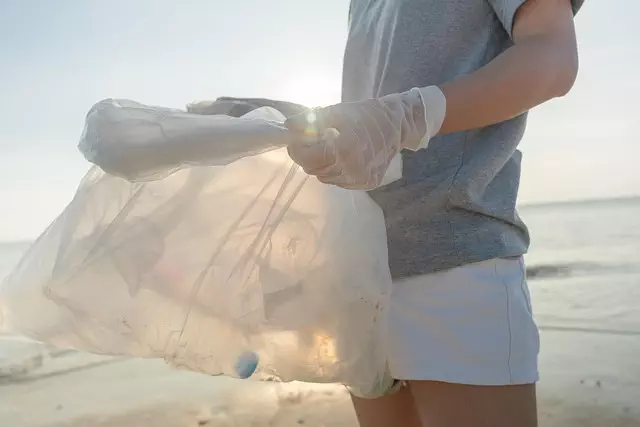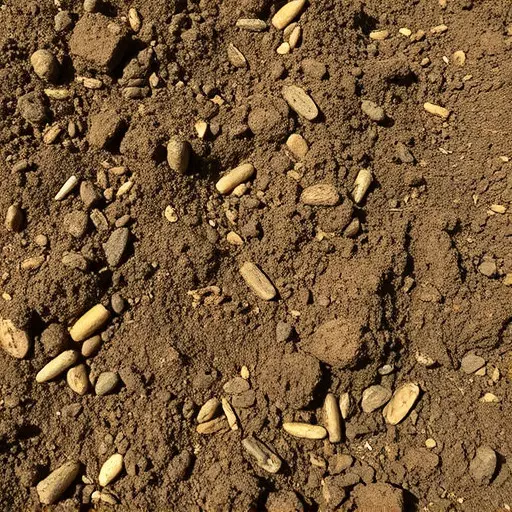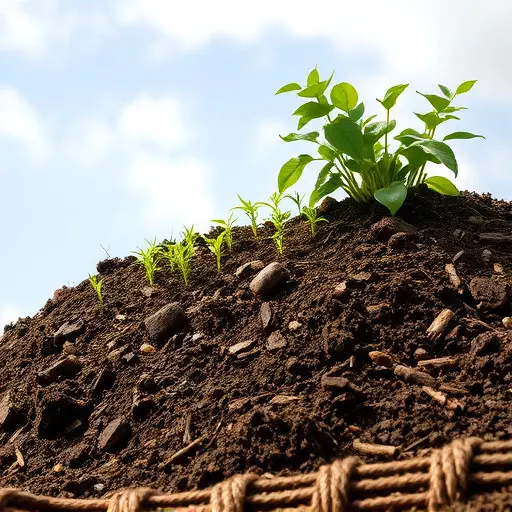Soil health is crucial for sustainable agriculture and ecosystem resilience. By understanding soil as a dynamic system, farmers can optimize factors like organic matter content, nutrient cycling, water retention, and microbial activity. In urban areas, topsoil recycling services in Toledo transform municipal waste into compost, promoting local food production, reducing landfill use, and minimizing greenhouse gas emissions. This approach not only restores topsoil but also boosts soil fertility, benefiting both environmental preservation and agricultural productivity. Advanced technologies like remote sensing and IoT devices enable continuous real-time monitoring of soil health, empowering informed decision-making. Successful projects in Toledo have leveraged these services to revitalize degraded soils, contributing to sustainable urban development and healthier ecosystems for future generations. Emerging innovations in topsoil recycling and restoration techniques hold promise for enhancing soil structure, biodiversity, and climate mitigation.
Soil health is the cornerstone of sustainable agriculture, yet understanding its intricacies remains vital. This article explores the multifaceted world of soil vitality, delving into how topsoil plays a pivotal role in ecosystem balance and the impact of recycling services on restoration efforts. We uncover organic waste recycling as a promising solution, highlighting successful initiatives in Toledo that utilize this method. Additionally, we review monitoring techniques, their benefits for farmers and community gardens, and glimpse into future innovations poised to transform soil health management globally.
- Understanding Soil Health: The Foundation of Sustainable Agriculture
- The Role of Topsoil in Ecosystem Balance and How Recycling Services Contribute
- Organic Waste Recycling: A Viable Solution for Enhancing Soil Restoration
- Monitoring Techniques: From Traditional Methods to Advanced Technologies
- Benefits of Regular Soil Health Assessment for Farmers and Community Gardens
- Case Studies: Successful Soil Restoration Projects Using Recycling in Toledo
- Future Prospects: Innovations in Soil Health Management and Their Impact on Environment
Understanding Soil Health: The Foundation of Sustainable Agriculture
Soil health is a cornerstone of sustainable agriculture and ecosystem resilience. Understanding soil as a living, dynamic system supports the growth of nutritious crops while promoting environmental balance. Factors like organic matter content, nutrient cycling, water retention capacity, and microbial activity collectively define soil health. By focusing on these aspects, farmers can enhance soil structure, improve fertility, and mitigate risks associated with extreme weather events.
In urban areas, topsoil recycling services in Toledo play a vital role in promoting sustainable agriculture practices. Organic waste recycling initiatives transform municipal solid waste into valuable compost that enriches the soil, reduces landfill space, and minimizes greenhouse gas emissions. This circular approach to soil management not only supports local food production but also contributes to broader environmental sustainability goals.
The Role of Topsoil in Ecosystem Balance and How Recycling Services Contribute
Topsoil plays a critical role in maintaining ecosystem balance. As the uppermost layer of soil, it supports plant growth by providing essential nutrients and moisture retention capabilities. Additionally, topsoil acts as a carbon sink, storing organic matter that helps to mitigate climate change. However, this vital layer is often depleted through erosion, urban development, and unsustainable agricultural practices.
In Toledo, topsoil recycling services have emerged as a powerful tool for soil restoration. These services focus on collecting and processing organic waste, such as yard trimmings and food scraps, to create nutrient-rich compost that can be returned to the land. Organic waste recycling not only reduces landfill waste but also enhances soil fertility, promoting healthier plants and ecosystems. By utilizing topsoil recycling services, communities in Toledo contribute to sustainable practices that support both environmental preservation and agricultural productivity.
Organic Waste Recycling: A Viable Solution for Enhancing Soil Restoration
In today’s digital era, recognizing the importance of soil health is more crucial than ever. One innovative solution that stands out in the realm of soil restoration is organic waste recycling. This eco-friendly practice involves transforming organic byproducts from various sources, such as agricultural and municipal waste, into nutrient-rich compost, which can then be used to enhance topsoil quality in Toledo and beyond. By leveraging topsoil recycling services, communities can significantly contribute to the revival and sustainability of their local ecosystems.
Organic waste recycling offers a viable path towards sustainable soil management. The process involves collecting organic materials like food scraps, yard trimmings, and agricultural residues, which are then decomposed through controlled processes. This results in the production of compost that is packed with essential nutrients vital for plant growth and overall soil health. By incorporating this recycled material into degraded soils, it becomes possible to improve water retention, enhance biological activity, and increase the fertility of the land—all key factors in promoting robust ecosystems and sustainable agriculture practices.
Monitoring Techniques: From Traditional Methods to Advanced Technologies
Soil health monitoring has evolved significantly, transitioning from traditional methods to advanced technologies. Historically reliant on manual sampling and lab analysis, which is time-consuming and labor-intensive, modern techniques offer more efficient solutions for assessing soil quality. These include remote sensing, where satellite imagery and drones provide a bird’s-eye view of soil conditions, enabling farmers and agronomists to identify patterns and anomalies at a larger scale.
Additionally, innovative tools like soil sensors and IoT (Internet of Things) devices allow for continuous monitoring in real-time. These technologies can measure key parameters such as moisture levels, pH balance, nutrient concentrations, and organic matter content directly within the soil. Integrating data from these advanced monitoring techniques with topsoil recycling services in Toledo and soil restoration practices facilitates more informed decision-making. Moreover, leveraging organic waste recycling as a source for enhancing soil fertility further contributes to sustainable agricultural practices and a healthier ecosystem.
Benefits of Regular Soil Health Assessment for Farmers and Community Gardens
Regular soil health assessment is a game-changer for both farmers and community gardeners in Toledo. By consistently monitoring their soil’s condition, they can unlock a multitude of benefits that contribute to sustainable agriculture practices. For instance, identifying nutrient deficiencies or imbalances early allows for targeted applications of organic waste recycling programs, enhancing soil restoration efforts and promoting topsoil recycling services. This proactive approach not only improves crop yields but also mitigates the risk of environmental degradation by minimizing the use of synthetic fertilizers.
Moreover, regular assessments enable farmers to track the long-term health of their soil, which is crucial for maintaining ecological balance. Community gardens can similarly benefit from this practice, fostering a healthier and more vibrant landscape. With proper knowledge, residents can incorporate organic waste recycling into their gardening routines, ensuring a constant supply of rich topsoil that supports robust plant growth. This holistic approach to soil management ensures the longevity of local green spaces while promoting a sustainable future for both agricultural and urban ecosystems.
Case Studies: Successful Soil Restoration Projects Using Recycling in Toledo
In Toledo, several successful soil restoration projects have leveraged the power of topsoil recycling services. These initiatives showcase how organic waste recycling can transform urban landscapes and revitalize degraded soils. For instance, local municipalities have partnered with specialized topsoil recycling companies to divert organic waste from landfills, using it as a valuable resource for revamping local parks and green spaces.
By employing these topsoil recycling services toledo, communities have seen significant improvements in soil structure and fertility. The integration of organic matter from recycled sources has enhanced water retention, promoted nutrient cycling, and fostered healthier ecosystems. These case studies not only highlight the environmental benefits but also demonstrate how innovative waste management practices can contribute to sustainable urban development, ensuring vibrant and resilient communities for future generations.
Future Prospects: Innovations in Soil Health Management and Their Impact on Environment
The future of soil health management holds immense potential for environmental sustainability thanks to emerging innovations. One promising approach is the increased utilization of topsoil recycling services, such as those offered in Toledo, which focus on recovering and restoring valuable topsoil layers. By implementing efficient recycling strategies, organic waste can be transformed into nutrient-rich soil amendments, fostering healthier and more fertile ground.
Additionally, advancements in soil restoration techniques enable us to remediate degraded lands, promoting ecological balance. Organic waste recycling plays a pivotal role here by introducing beneficial microorganisms and reducing the need for synthetic inputs. These innovative practices not only enhance soil structure and biodiversity but also contribute to mitigating climate change by sequestering carbon and reducing greenhouse gas emissions associated with traditional farming practices.


